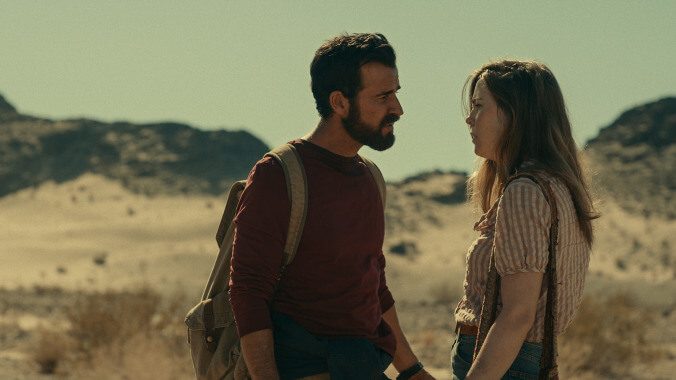Apple TV Plus’ The Mosquito Coast is a hollow drama with strong performances

Much like its apathetic protagonist Allie Fox (Justin Theroux), Apple TV+ drama The Mosquito Coast is often vain because it doesn’t have the substance to back up its prestige. The thriller is beautifully shot and performed, but in terms of meaningful content or stories, it rings hollow. The series is loosely inspired by Paul Theroux’s (yes, Justin’s uncle) 1981 novel of the same name, but it distinctly veers away from its source material. In the book, disgusted by American capitalism and culture, Allie strives to move his family to Central America’s eponymous Mosquito Coast. The show’s Allie is also a conceited, genius inventor who forces his wife and kids to escape, this time to Mexico, because the government is after him. The Mosquito Coast is only interested in following their arduous journey without ever really divulging any insights into the actions of Allie and his wife Margot (Melissa George).
The creative choice to provide little to no backstory severely dulls the show’s impact. The Mosquito Coast remains just a surface-level, sepia-toned thriller about a family on the run, mostly to coax the vanity of its patriarch. Allie’s massive ego is essentially like a fifth family member, along with Margot and their two teen children, Dina (Logan Polish) and Charlie (Gabriel Bateman). The swift pace of the drama helps build some suspenseful momentum as the Foxes deftly navigate the challenges they face on the road, of which there are plenty. The compelling performances, especially by Theroux and Polish, help sell the urgency of their situation despite the series never clearly illustrating what they’re fleeing from or why.
When the show begins, the family is living on an isolated farm in Stockton, California, and Allie is occupied by his newest contraption that turns fire into ice. The kids are homeschooled and are not allowed to use any form of technology. It’s immediately obvious that Allie and Margot are in hiding, but their brood doesn’t realize it. Dina is suspicious, while Charlie worships his father and goes along with his unconventional teaching methods. By the end of hour one, The Mosquito Coast upends the family’s status quo and puts them on the run because they’ve been discovered. This kicks off a promising arc, but over the next six episodes, repetitive plotting manages to turn their physical obstacles and personal dynamics into laborious viewing. How many times can the Fox family narrowly escape disaster before it borders on downright inconceivable?
Allie arranges for his family to escape to Mexico with the help of old acquaintances. The Foxes have to trek across hazardous areas of the desert early on without any idea how to survive the harsh conditions. They get help from a coyote named Chuy (Scotty Tovar), who aids them in crossing the border but not without sufficient dramatic clashes with Allie. Chuy has his own motives for helping them that come into play in the later episodes of The Mosquito Coast, the end result of which is just the Foxes absconding from more than one entity. This twist only makes it even more incredulous that Allie, Margot, Dina, and Charlie are able to evade capture while bodies keep dropping around them. If only there was more information about Allie and Margot’s past, besides his apparently brilliant mind, to make it all make sense; by the time the pair provides vague tidbits to their children, it’s too late to add much context.
The Mosquito Coast’s greatest limitation is that it’s so committed to the gun-toting, frivolous action of its setting, the show doesn’t value fleshing out the characters. It’s hard to empathize with Allie, who is clearly bound by his rigid principles, even when he claims his driving force is his love for his family. He is perturbed by American capitalism and greed—again, no one really knows why—so he chooses to put his loved ones in other forms of danger, like crossing a precarious desert, the same land traveled by immigrants seeking even a smidgen of the same security Allie voluntarily discards. Margot is faithful to her husband and rarely questions him. When she does, he convinces her to follow along anyway. The only one to stand up to Allie is his rebellious daughter. Dina is sharp and doesn’t put her parents on a pedestal like her younger brother does, even if it means sometimes falling into the angsty teen stereotype.
This family thriller is meant to fall in the same vein as crime dramas Ozark or Breaking Bad, which scored awards recognition for the series and their lead actors. While The Mosquito Coast wastes its storytelling potential, Theroux does deliver a gratifying performance that might beckon Emmy nods (well-deserved after The Leftovers snubs). He successfully portrays Allie’s bitterness, fear, and the calmness that comes during his moments of respite. George doesn’t get nearly as many standout scenes, but she makes the most of the role, especially in episode four, “Bus Stop.” Relative newcomer Polish is a breakout as Dina. These solid performances anchor The Mosquito Coast, as does the show’s stunning cinematography and direction that effectively use its secluded locales. Otherwise the drama ends up being pretty mundane. It’s fun enough to follow along, but the payoff is far from satisfactory.